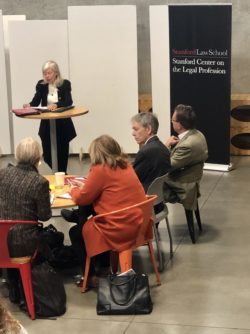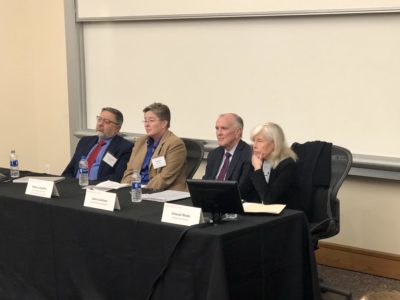Stanford Law School’s Deborah Rhode on the Access to Justice Challenge in U.S.

On October 31, the Stanford Center on the Legal Profession marked its ten-year anniversary by convening a two-day conference on legal services regulation and access to justice, which included the president of the American Bar Association, a judge from Utah’s Supreme Court, and other experts. In the Q&A that follows, the center’s director, Deborah Rhode, the Ernest W. McFarland Professor of Law, discusses economic disparity in legal services delivery in the United States, barriers to change, and reforms necessary to improve the situation.
Task forces in California, Utah, and Arizona have recommended regulatory changes to accelerate innovation in the delivery of legal services. Can you start by giving us an overview of the problem and explain why you think we need innovation in the delivery of legal representation and access to justice?
Well, three decades ago, President Jimmy Carter chided the American Bar for perpetuating a system in which 90 percent of our lawyers serve 10 percent of the people. The situation has not improved. We are over-lawyered and under-represented, and what passes for justice in the justice system falls far short of aspirations. In this country, over four-fifths of the legal needs of the poor are unmet and half of the legal needs of people of modest means are estimated to be unmet.
If you think about collective problems people face, it’s a much larger number. We lag behind most developed countries in our spending on civil legal aid; in rankings by the World Justice Project, we’re tied for 99th in terms of access and affordability of civil justice.
Access to justice is what we put on the courtroom doors, but it by no means describes what goes on inside them. And for 75% of the cases that come into civil justice courts in the states, one or both parties is unrepresented. So, we have people who are navigating a system that is designed by and for lawyers.
What should be done?
We need changes to simplify the legal system—to make it more readily accessible to non-lawyers. We need changes in the rules governing the unauthorized practice of law and financial investment in legal services in order to increase the range of providers and the innovations that they can bring to the table get legal assistance to all the people who are not realistically able to afford lawyers. We also need to increase legal representation for the people who do qualify for Legal Aid, because that vital service is severely under-funded.

So is it a matter of not enough lawyers? Or is it a matter of we’ve got plenty of lawyers, just not enough willing to meet the needs of people who don’t have money to pay for them?
It’s more the latter problem than the former—too many lawyers chasing the same deep pockets. It’s a distributional issue. We have about the same percentage of the world’s lawyers as we have a percentage of the world’s GDP, but other countries have much more sensible systems for resolving routine legal problems—solutions that do not require lawyers and courts and that rely more heavily on non-lawyer experts and administrative agencies. In many other nations, there’s also much more variety in service providers and much more consumer choice, with no decrease in quality.
In other countries—the UK, for instance—there are different levels of legal training. Is that what you think would work here?
I do. In an ideal world, you would want people with one year of training, two years of training, and three years of training, each doing different tasks that require different levels of expertise. And you would want some kind of a regulatory oversight structure for all of those people, but not one controlled by the organized bar (which is lawyers regulating lawyers).
The UK, like most countries, does not criminalize delivery of legal advice by non-lawyers. They have Citizens Advice Bureaus, which are funded partly by the government, where people get free legal advice from trained experts. And there’s quite a bit of research that suggests that those experts provide higher quality services, with higher client satisfaction than lawyers. That shouldn’t be surprising, because they’re trained specialists who just focus on are certain fields of the law, and have considerable expertise those fields. And they have time to spend with clients in a way that high-priced lawyers typically don’t.
You would advocate for a tiered system.
Right. Yes. And if I were writing on a clean slate, I would also redesign legal education. So there would be one-year programs, two-year programs, and three-year programs, and there would be many opportunities for less expensive credentials. A graduate under that system wouldn’t have the debt burdens that now makes it impossible for many of them to go into nonprofit or direct services representation.
Why do we have a problem of this magnitude?
The legal profession’s own regulatory rules are a big part of the problem.
I just had one of the leaders of the UK Regulatory Reform Initiative who was attending our conference come to my legal ethics class. In arguing that the U.S. needs an independent regulatory agency similar to the one in Great Britain, he asked students, ‘How many of you think that Wells Fargo should decide what the regulations should be for the financial services industry? Raise your hands!’ That thought experiment pushes us to ask: Why should American courts grant so much power to the organized bar to define and enforce conduct regulations when it has such a vested interest in protecting the status and income of its members?
But don’t states regulate practice?
Of course, nominally it’s the state courts that have asserted the power to regulate the practice of law. But they’ve delegated so much of the control over the content of regulations to the organized bar in their states. So now, it isn’t truly an independent regulatory system. And in a few instances where efforts have been made to open up the system to trained non-lawyers—for example, in Washington state—the court made the mistake of giving the bar the power to set credentials. And guess what? That system in its first years graduated about 12 licensed legal technicians, none of whom were able to provide significant cost advantages, because the barriers to entry were so high.
So we need more regulatory independence. But the trick really is how to make that happen.
How does that happen?
Well, we need to engage more stakeholders to view access to justice as significant social problem and to demand that the bar not control the solutions. That will require more proactive initiatives by the public and the state Supreme Courts.
Are any states successfully taking more action to reform the delivery of legal services?
Utah is a wonderful example of a state where the court is taking the lead on creating an independent regulatory body to at least govern non-lawyer provision of service. And that’s really a step in the right direction. But in general, it has proven very difficult to get state court judges to assume that kind of leadership role. Oftentimes they’re elected, and they depend heavily on the organized bar for support, ratings, and campaign contributions. . So, state judges are often reluctant to tangle with the bar on issues where the profession’s own interest is perceived to be at stake.
But many of the state court justices recognize that the system is completely dysfunctional right now and that there’s no way realistically to provide lawyers for all the people who need assistance.
Will the ABA come around to these changes, or is it clear now that they’re not and that’s why it’s coming up through the states?
Well, the ABA does not control the rules that are in place. They promulgate model rules, which are then debated and adopted by state Supreme Courts. The problem is that the organized bar is often the only player in debates over the rule’s content, and the model rules that most state adopt without broad discussion are highly protective of the bar. The ABA, although it does many good things on other issues, does not speak for the public. It is, despite protestations to the contrary, a trade association. It speaks for lawyers’ interests. And of course lawyers claim that they’re speaking for the public interest in protection of quality, etc., but they’ve been highly resistant to evidence suggesting there are ways to deliver quality in a more cost-effective way. Lawyers generally perceive that their status and income is threatened by non-lawyer competition.
But of course, the Bar is not monolithic. I would guess that most of our graduates do not feel economically threatened from regulatory reform. But the rank and file of the profession really fears opening the delivery system up to tiered levels of training and competition. And even some elite lawyers likely feel it’s a foot in the door, and the accountants will be eating their lunch if we widen the entry points.
Are you optimistic about change?
Yes. And here, technology has made an enormous difference. For many years, for example, the Bar was able to shut down non-lawyer providers who were largely solo practitioners or part of small-scale organizations. Now that they’re online, that’s a much harder task. And when you have large online platforms like Legal Zoom, with resources to fight the bar, and when you have demand bubbling up from consumers who want easily accessible affordable assistance online, the train to reform has left the station. Many enlightened members of the bar recognize that they need to be less part of the problem, and more part of the solution. And if they don’t figure out a way to do that, it will be done for them in ways that they don’t like. So yes, I am an optimistic. I think there’s much more possibility for change than when I started writing about this four decades ago, but I don’t underestimate the challenges in getting to where equal justice will be more than just a slogan that we put on courthouse doors.
